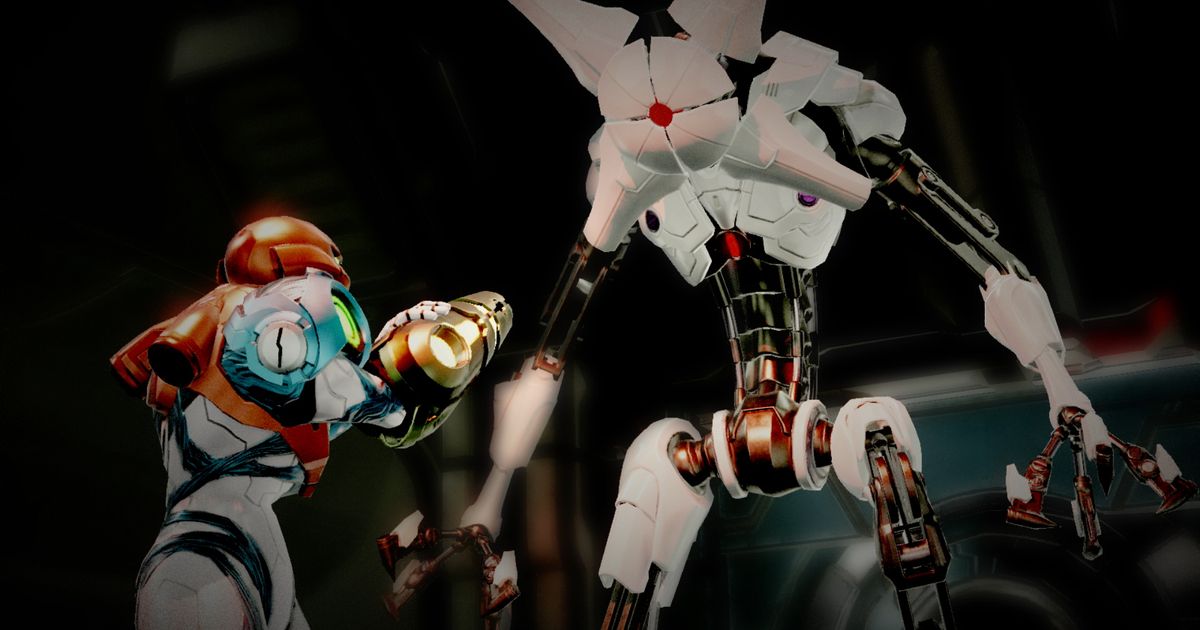
It’s not clear what’s next for Samus Aran, but Metroid Dread is an ending, not a beginning.
The trailer Nintendo delivered during its June 2021 showcase briefly flashed “Metroid 5” on the screen before revealing the upcoming Switch game’s true title. There was intent behind that number: Dread will be the fifth mainline game in the series, and even though it’s the series’ first appearance on Switch it’s also something of an ending for Metroid as we know it.
Just to recap: The “main” Metroid games so far are Metroid, released for the NES in 1986; Metroid II: Return of Samus, the 1991 Game Boy game; Super Metroid, for SNES, released in 1994; and Metroid Fusion, the 2002 Game Boy Advance title. Anything else is either a remake (like Samus Returns for 3DS) or another timeline (like the Prime trilogy).
Dread is set to be the fifth game in what Nintendo has now confirmed is a five-part saga. Producer Yoshio Sakamoto, also one of the key creative figures at Nintendo behind the series as a whole, clarified what that actually means during a Wednesday presentation for press that delved deeper into the upcoming game.
[embedded content]
“The Metroid story until this point has dealt with Samus’s strange fate that’s been intertwined around this being called the Metroid,” Sakamoto said, through a translator. “That has been the focus of the series. But what this game represents is a bit of a pause, or a new start to something else.”
Nintendo wants fans to understand what “end” really means in this context. The adventures of Samus Aran will continue in some form after the release of Dread. “We want people to know that there is some kind of new episode that is waiting in the works, and we want you to look forward [to] what we do with that next, but there are no specifics now.”
It’s worth mentioning here that at the start of the presentation, Nintendo said Sakamoto wouldn’t be fielding any questions about Metroid Prime 4. In 2017, the company announced its long-awaited next chapter in the first-person Metroid series that started its life on the Wii, and then subsequently confirmed in 2019 that development on the sequel was essentially restarting. Make of that what you will.
Dread falls close in its look and style to Metroid: Samus Returns, the Nintendo 3DS remake of Metroid II released in 2017. That’s no accident; MercurySteam, the studio that worked with Nintendo to build the remake, is back in the same role on Dread. In fact, the new game borrows directly from MercurySteam’s predecessor, bringing back elements such as the melee counterattack that introduced additional complexity to the pace and feel of the series’ side-scrolling action.
“This game represents a bit of a pause, or a new start to something else.”
The new game’s roots extend much further back, however. Sakamoto explained that the idea for Dread actually goes back roughly 15 years. The inspiration is 2002’s Metroid Fusion, which introduced the antagonist called SA-X, a fearsome, shape-shifting parasite that made itself look like Samus. The SA-X appeared for most of the game as an unstoppable threat, with the real Samus being forced to run and hide whenever it arrived on the scene.
That concept of an invincible, terror-inducing menace is the reason for the new game’s title. Throughout Metroid Dread, Samus will travel through areas that are patrolled by E.M.M.I., a speedy and agile robot with keen hearing and the ability to detect motion. Avoiding E.M.M.I. is a tense and often-fraught challenge, though Samus can employ tools like the new Phantom Cloak to conceal herself and get away.
During a live demonstration of Dread that preceded the interview, the tension was palpable as the demo’s driver evaded E.M.M.I. as he worked out a puzzle built around redirecting the flow of electricity to open a particular door. The marauding robot can slip through all the same tight spaces as Samus in her Morph Ball form, and its ability to hear footsteps is visualized by a massive yellow circle that players will see before E.M.M.I. itself appears.
Sakamoto offers a word of caution, though: Metroid Dread does aim to fill players with terror during these sequences, but that doesn’t mean the game is necessarily an easy fit for the horror genre. It’s intentionally not that, in fact.
[embedded content]
“It’s really about Samus encountering fear. But she stands against that fear, and fights it and beats it. That part is important,” Sakamoto explained. It’s not clear what sorts of weapons Samus is eventually able to bring to bear against E.M.M.I., but if we’re using Fusion as a reference point: The nigh-on unbeatable SA-X is eventually a late-game boss.
The takeaway from the demonstration is that, for any tonal shifts or new additions, this is fundamentally still a Metroid game, and a 2D Metroid game specifically. You’re still exploring freely, still hunting down tools and power-ups that open up new areas of the map, and still taking on an array of actually-beatable alien threats. There are boss fights and different suits to wear and secrets to discover. There will probably be actual Metroids too, though none popped up during the demo.
“My motivation for making a new Metroid game is always to make the best possible thing for people to get their hands on,” Sakamoto said. It helps that the idea behind E.M.M.I. is a long time in the making, and that it’s now technologically possible to execute on ideas that were conceived more than a decade ago.
Sakamoto continued: “It is really better than I imagined those 15 years ago when I had the idea for for this and seeing that realized made me really, really satisfied. I really can’t wait for all of you to get your hands on this game.”
Metroid Dread is coming exclusively to Nintendo Switch on Oct. 8, 2021.
